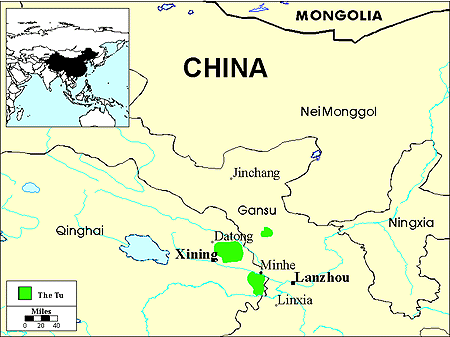|
|
Prayer Profile
The Tu of China
![[IMAGE]](../images/0146.jpg) More than two hundred thousand Tu live in the foothills of the Qilian Mountains of north central China, just below the Mongolian border. Their history began in 1227 when the Mongol army invaded the region that the Tu now call home. Mongolian soldiers began to intermarry with local villagers, and their offspring became the ancestors of the Tu. For this reason, the Tu often refer to themselves as the "White Mongols."
More than two hundred thousand Tu live in the foothills of the Qilian Mountains of north central China, just below the Mongolian border. Their history began in 1227 when the Mongol army invaded the region that the Tu now call home. Mongolian soldiers began to intermarry with local villagers, and their offspring became the ancestors of the Tu. For this reason, the Tu often refer to themselves as the "White Mongols."
The Tu language, Mongour, seems to be a form of ancient Mongolian. In 1979, a Tu script that was based on the Roman alphabet was created, and is now being taught in local schools. A bi-monthly magazine is published in Mongour, which is a very rare occurrence since China's government is trying to eliminate the use of all minority languages.
The Tu have traditionally been goat and sheep herders; however, some have now turned to farming.
What are their lives like?
Overall, the Tu way of life is quite similar to that of modern day
Mongolians; however, their dress clearly distinguishes them from other peoples (Mongols, Tibetans, and Hui) living in the area. Their clothing is characterized by its elaborate and complex needlework. Women's dress includes heavily embroidered, brightly colored sleeves that give their outfits a "rainbow" effect. Even their shoes are embroidered in vivid, multicolored patterns. In the winter, white felt hats are worn by both men and women.
The Tu incorporate two distinct types of "marriage" into their culture. The first is the usual practice of arranged marriages, after which the brides go and live with the grooms' families. The second "marriage" is a ceremony that takes place when a young girl reaches the age of fifteen, after which she is considered as being "married to Heaven." She continues to live with her own family, but is allowed to take in different sexual partners. Any children born to her will become members of her father's family.
An unmarried Tu woman wears a single ponytail to indicate her status to prospective partners. If a woman is still single by the time she has reached her mid-twenties, she is permitted to bear children out of wedlock so that she might avoid the disgrace of not having borne any children. The whole community cares for these illegitimate children.
The Tu are well known for their singing and dancing. They are extremely fond of festivals, and celebrate them with daola (folk songs) and anzhao (dancing groups). They are also known for their hospitality. When a guest comes to a Tu village, he is presented with a ceremonial wine tray containing three cups of barley wine. He is welcomed into the village only after having drunk all three cups of the wine. Once inside, he is presented with three more cups of wine that he must drink. Then, a final three cups are given and must be drunk before he leaves the village. If a visitor fails to observe this custom, the Tu villagers are highly offended.
What are their beliefs?
Since 650, the Tu have practiced Lamaistic Buddhism. Families that have more than one son are expected to send one of the boys to become a monk. Four large Buddhist monasteries are located in the Tu region. These monasteries earn large amounts of money by leasing grain mills, taxing the people, renting land, and lending money.
Two types of shamans (Buddhist priests) can be found among the Tu. "White shamans" are thought to cure, while "black shamans" bring vengeance. Another highly regarded religious figure is the kurtain. This is any person believed to be possessed by a Taoist spirit.
What are their needs?
In the 1920's and 1930's, Catholics were very active in this region. Presently, however, there is no known Christian work among the Tu. There are no Christian broadcasts in their area and the Bible has not been translated into Monguor.
Prayer Points
- Take authority over the spiritual principalities and powers that are keeping the Tu bound.
- Ask God to soften the hearts of China's governmental leaders towards the Gospel.
- Pray that the doors of China will soon open to missionaries.
- Ask the Lord to call people who are willing to go to China and share Christ with the Tu.
- Pray that God will strengthen and encourage the underground Chinese believers.
- Ask God to raise up qualified linguists who can translate the Bible into Mongour.
- Pray that Christian literature, radio broadcasts, and television programs will soon be made available in the region where the Tu live.
- Ask God to raise up a strong local church among the Tu.

Statistics
Latest estimates from the World Evangelization Research Center.
THE PEOPLE
- People name: Tu
- Country: China
- Their language: mongour
- Population:
- Largest religion:
- Christians: <1%
- Church members: 61
- Scriptures in their own language: None
- Jesus Film in their own language: None
- Christian broadcasts in their own language: None
- Mission agencies working among this people: None
- Persons who have heard the Gospel: 20,300 (10%)
- Persons who have never heard the Gospel: 182,500 (90%)
THEIR COUNTRY
- Country: China
- Population:
- Major peoples in size order:
- Major religions:
- Number of denominations: 42
© Copyright 1997
Bethany World Prayer Center
This profile may be copied and distributed without obtaining permission
as long as it is not altered, bound, published
or used for profit purposes.
![[HOME BUTTON]](../graphics/home.jpg)
![[CALENDAR BUTTON]](../graphics/calico.jpg)
![[LIST BUTTON]](../graphics/listico.jpg)
[Home]
[Calendar]
[Country List]
|